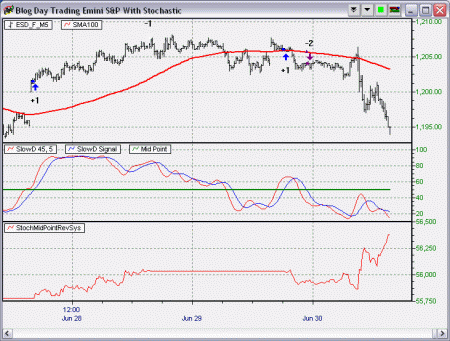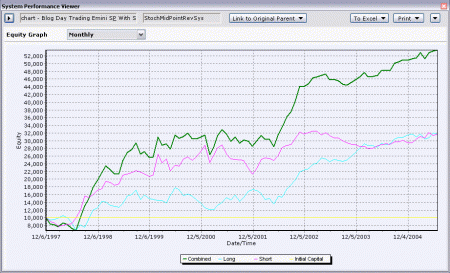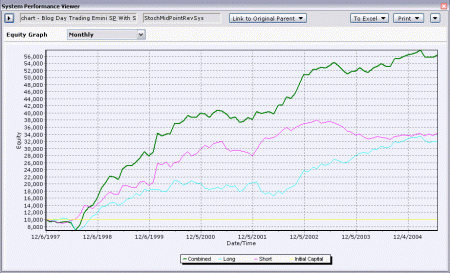Daytrading The Emini – An Update (Stochastic Midpoint Reversal System)
Back in August 2003, I have an article called Daytrading The E-mini published in the Technical Analysis of Stocks & Commodities magazine. It described a technique called Data Reduction that improves certain type of indicator performance drastically. The technique is applied onto a basic trading system that works very well at that point in time. We are going to take a look at the system today to see if it is still performing as expected.
The System
The setup of the system is very simple.
1. Emini S&P, 5-minute bar
2. Chart only the trading time from 9:45 AM to 4:00 PM Eastern Time. That means we are leaving out both the first and last 15-minutes of data from the regular trading hours.
3. Filter trades by using 100 period simple moving average (SMA100) – will go long if and only if price is above the SMA100, and will go short if and only if price is below the SMA100
4. Our signal line – 10 period average of Stochastic SlowD (45, 5)
5. Go long if signal line cross above 50
6. Go short if signal line cross below 50
7. Always exit the position by 4:00 PM (a daytrading system)
The original system was created with formulas entered as long and short signals into NeoTicker’s Backtset EZ indicator for quick and dirty testing.
The complete version is now rewritten in indicator formula that you can download here. You can use indicator manager to install the downloaded formula script file.
Data Reduction
To correctly setup your chart, make sure you customize the chart’s Data Setting through the Chart Manager. The data you’ve collected are not affected at all, it is just this particular chart that will use reduced data only.
NeoTicker’s SlowD
Here is a screenshot of the system in action.
Notice that after data reduction, the SlowD is much more smoother at the start of the day as the unnecessary volatility are skipped. One special thing about NeoTicker’s SlowD indicator is that it is based on the original exponential moving average formula, not the modified version used in many other applications today.
The Performance
Here is the equity curve of the system tested all the way back from year 1998 to Jun 2005.
See how the system performs since the original article was published. It is holding up well indeed.
A Twist
Personally I do not like to monitor signals in the afternoon, as indicated in other systems I posted here. So, I have added an extra rule to the system so that you can control the time to stop starting new position in the day.
If you set the time to, say, after 4:00 PM, then the system will behave exactly like the original one.
If you set the time to 12:00 PM, the usual time I use, you will get a some what different performance. Actually, a better one based on the equity curve below,
Summary
The concept of data reduction is seldom mentioned anywhere in technical analysis textbooks, because there was no software available that can do that properly before NeoTicker’s introduction. Since it is now possible, you’ve got one more tool to help you trade better.














